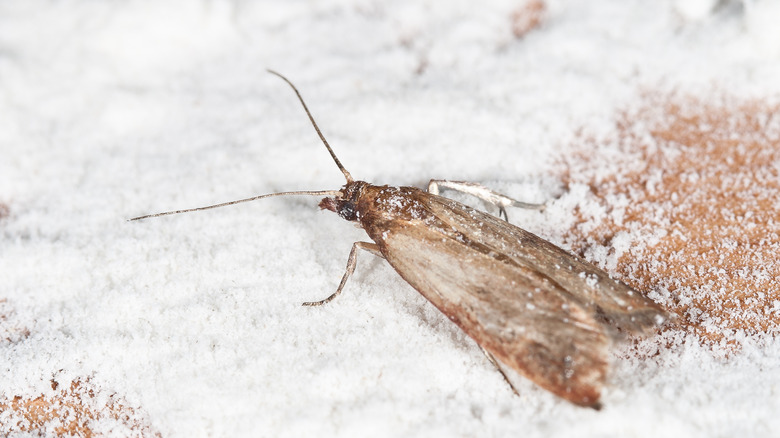Use This DIY Vinegar Spray On The Insides Of Your Cabinets To Deter Pantry Moths
As the winter holidays approach, getting the kitchen organized is helpful to make sure food preparation goes smoothly. Having the pantry stocked with staples and baking ingredients may feel like a good plan. But if you have pantry moths, you could be looking at an invasion that can contaminate opened packages, especially grain-based foods like flour, cereal, crackers, or rice. Cleaning your pantry thoroughly and using a preventive spray can help deter these pesky moths from taking up residence. We have a recipe for an effective DIY spray to repel pantry moths that's inexpensive and easy to make.
Pantry moths, also called grain moths, sometimes arrive in packaged foods. They're adept at getting into small openings, so even if you try to reseal opened bags or boxes, or put them in plastic ziploc-style bags, they can still multiply in your pantry. Storing opened grain-based food in glass jars is a good way to prevent infestation, but you will want to use additional deterrents. Using products with a smell moths find repelling can help. Pantry moths hate the smell of vinegar, and certain essential oils also effectively repel them.
Specifically, pantry moths dislike the smell of cedar, peppermint, and lavender. Luckily, these essential oils are affordable and widely available, and, mixed with diluted white vinegar, make an excellent spray to help deter them. Using this spray, along with doing a thorough inventory of open products, and cleaning your pantry with a vacuum and soap and water, will help get rid of and prevent pantry moths.
Making a moth-deterrent spray
This DIY spray is very simple to make. You first need to acquire the right essential oils. The most effective ones for this spray are cedar, lavender, and peppermint. Some people are allergic to some essential oils, and sometimes direct skin contact can cause mild skin irritation, so exercise basic precautions. Avoid getting peppermint oil on your face or near your eyes as it can be a mild skin irritant.
Peppermint is generally a very effective insect repellent, as many bugs simply dislike the smell intensely, as do many rodents. Lavender and cedar are both known for their ability to repel the moths that like wool, as seen by the many lavender and cedar products sold for closet and dresser storage of woolens. The combination of all three, along with the vinegar used, is a good recipe for deterring pantry moths. What's more, this natural insect repellent smells really good.
You can use a plastic or glass sprayer bottle, but glass is generally better for essential oil mixtures, as some plastics can break down from essential oil contact. Amber or cobalt blue glass bottles help protect the mixture from sunlight, and you should store the spray bottle in a dark, cool place. Add equal parts white vinegar and water to the sprayer bottle. Then, for every 12 ounces, add 10 drops each of cedar (sometimes sold as cedarwood), lavender, and peppermint essential oils. Shake gently to blend, and shake gently before each use. Spray into corners, and especially into any cracks or crevices, where moths or larvae might be hiding.
Keeping your pantry free of moths
Once you have cleaned and organized your pantry, and sprayed it thoroughly with the moth-deterring spray, you're all set, right? Well, no. Once you get an infestation of pantry moths, it can take up to a month or more to get rid of them. So continue to keep your pantry clean, and be especially diligent about this for a few weeks after finding grain moths.
Wipe down the surfaces with a damp soapy sponge once a week. Spray the corners of your pantry with the vinegar spray and let the surfaces dry before replacing items. This may seem like a lot of work, but if you do it for a few weeks, it will give you the best chance of keeping the moths away for the long term. Using the spray often will provide an ongoing defensive measure to deter the moths from returning. For an extra dose of natural moth prevention, you can store your garlic bulbs in the pantry; moths also hate the smell of garlic.
Another good preventive measure is to store your grain products in airtight glass jars. Moths can't get inside these containers, so the chances of an infestation will be much less. Airtight Tupperware or plastic food storage containers with tightly fitting lids are also suitable for storing your cereals, flour, crackers, and other grain-based products once you open the original container, but glass is best. Plastic food storage bags are not as effective, and moths can chew through them, so use glass if you can. Being diligent about storing dry goods properly will add another layer of protection from pantry moths.


